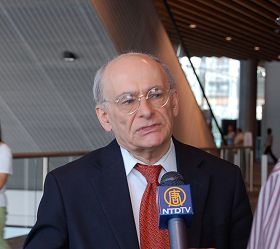(Clearwisdom.net) At the recent 23rd International Congress of the Transplantation Society held in Vancouver, Canada between August 15-18, Canadian human rights advocate David Matas gave a speech entitled, "Ending the Abuse of Organ Transplantation in China". In his speech, Mr. Matas called upon attendees to pay attention to the organ harvesting from living Falun Gong practitioners in China.
The 23rd International Congress of the Transplantation Society aimed to develop the science and clinical practice of organ transplants as well as provide guidance on the ethical practice of such procedures.
Mr. Matas, working together with David Kilgour, a former Canadian MP and secretary of state (Asia Pacific region), has published a report and book about illicit organ harvesting from Falun Gong prisoners of conscience in China. For the report, see (http://organharvestinvestigation.net/)
The Canadian Society of Transplantation is the first organization of its kind to initiate a policy directing doctors on how to deal with patients who want to become transplant tourists. The policy comes amidst the rise of transplant tourism around the world, and has been praised by human rights activists who have long objected to organ harvesting from unwilling and innocent victims.
The policy arose out of directives from earlier meetings of the World Health Assembly that urged member states to take measures to protect the poorest and most vulnerable groups from transplant tourism and the sale of tissues and organs.
The policy says patients should be warned about the ethical and medical dangers associated with transplant tourism. That includes providing information about how people who sell their organs may have been exploited or hurt, and that some organs may have been taken by force.
"The entire transplant tourism industry relies on secrecy, making it impossible to determine whether donor information provided by organ brokers, who are motivated by financial gain, is accurate," reads the policy.
If a patient goes ahead with an organ purchase, the new policy gives doctors the right to refuse to provide medical records, medication, or take other actions that may facilitate the patient obtaining a purchased organ.
"There is substantial evidence that the illegal transplantation of organs in an unregulated system poses significant risk to both recipients and organ vendors. Therefore, individual physicians may elect not to provide medical records to patients if they believe the information will be used in support of an illegal transplant performed in an unregulated system and that there is a significant risk of harm to the patient or organ vendor," reads the policy.
Mr. Matas said the international community needs to speak out against organ harvesting and that recently there has been a surge of interest in the issue as human rights groups and others take action.
"What we are seeing is more and more opposition to the sourcing of organs from prisoners."
Last week Amnesty International issued a call for countries to stop using organs from executed prisoners, singling out China for doing this, a practice Amnesty has documented since 1993.
Amnesty International, as well as leaders from pharmaceutical companies and other experts, participated in the congress.
Mr. Matas cited one major pharmaceutical company that answered a call by Amnesty to stop participating in clinical trials in China of anti-rejection drugs used to keep a patient's immune system from rejecting a transplanted organ.
"That's quite positive."
Matas said if one pharmaceutical company steps up, others may follow.
Copyright © 2024 Minghui.org. All rights reserved.
Category: Organ Harvesting










